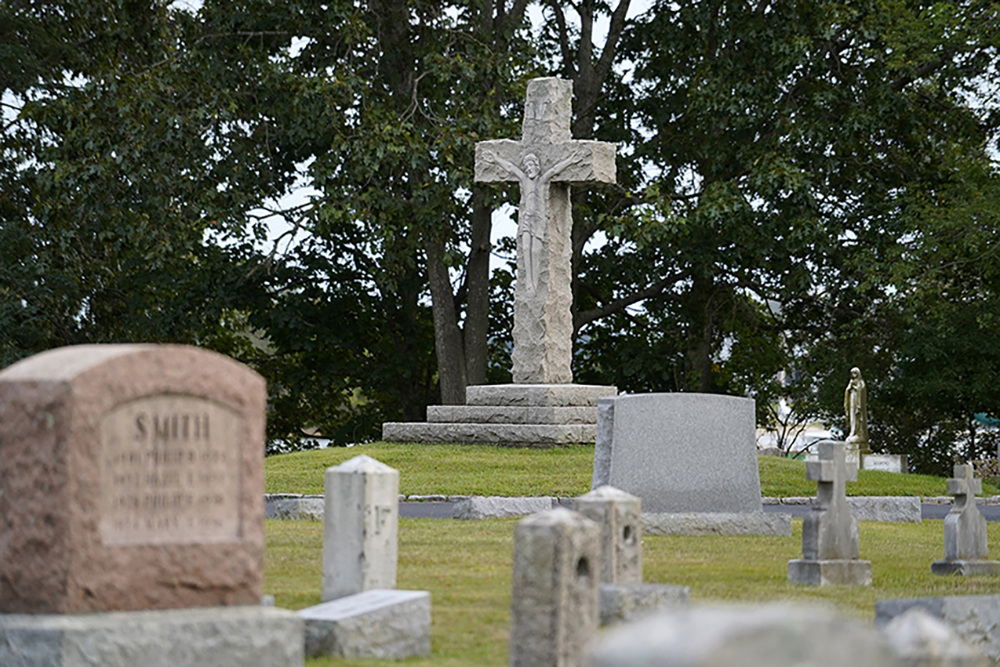Praying for the dead — an All Souls Day reflection

A granite crucifix is seen among the headstones in a Catholic cemetery. All Souls' Day, the commemoration of all the faithful departed, is Nov. 2. (OSV News /Gregory A. Shemitz)
My Vocation is Love / Lindsey Weishar
As we come upon the glorious feast of All Saints and the somber commemoration of All Souls, I am ever-more reminded of how intertwined the church is. Whether Church Triumphant (those in heaven), Church Suffering (those in purgatory), or Church Militant (those of us here on earth), we are connected by prayer for each other, and by the love of God who holds us all in being.
This October has been particularly marked by death. I had the experience of losing a grad school colleague to brain cancer earlier this month. He was only 36 and left a wife and three young children. The recent war between Hamas and Israel has been another painful blow to our common humanity as so many — including innocent civilians — have been lost. The war in Ukraine continues.
In the midst of so much devastation and death, we are called to pray — for peace, for justice, for the repose of the souls of the departed.
It was my colleague’s death that compelled me to look more closely at my own relationship to prayer. I came to recognize that my temptation to wonder if prayer really works after my colleague died was tied into a transactional view of prayer: I prayed, so why didn’t anything change for my colleague? Why do the wars rage on?
PRAYER IS ABOUT RELATIONSHIP
Interestingly, there seems to be somewhat of a misinterpretation in the broader society when it comes to prayer. Some feel that prayer is equivalent to inaction, that those who choose to pray would be better employed “doing something.” But the reality is that prayer — unlike many of the reactive ways our fast-paced, up-to-the-second, media-saturated society responds to the world’s ills — is true action.
Because of God’s movement in the church and in the world, we can be assured that our prayers are not only heard, but are effecting change.
What I’ve rediscovered is that prayer is about relationship, not exchange, and in turning to God, as opposed to in on ourselves or toward our neighbor who also has just as little control over the world and the lives of others as we do, we turn toward the source, the One who is always acting.
The Catechism of the Catholic Church describes our relationship to God in prayer like this:
“The prayer of Jesus makes Christian prayer an efficacious petition. He is its model, he prays in us and with us . . . Jesus also prays for us — in our place and on our behalf. All our petitions were gathered up, once for all, in his cry on the Cross and, in his Resurrection, heard by the Father. This is why he never ceases to intercede for us with the Father. If our prayer is resolutely united with that of Jesus, in trust and boldness as children, we obtain all that we ask in his name, even more than any particular thing: the Holy Spirit himself, who contains all gifts.” (2740-2741)
I love that God prays in us, that he is making our prayers “in our place and on our behalf.” In the mystery of God’s time, all that we will ever ask of God was “gathered up, once for all” in Jesus’ death and resurrection and, importantly, “heard by the Father.” So, prayer is less about what we do, and more about what God does in us. He begins the conversation, and we respond with our will and our hearts. And when we find ourselves empty, without anything to give, he fills us.
JOINING WITH THE WHOLE CHURCH
All Souls Day is a reminder to join with the whole church in petition for our brothers and sisters who have died. I’ve often been caught by these words from the first reading for the All Souls Day Mass:
“As gold in the furnace, he proved them, and as sacrificial offerings he took them to himself. In the time of their visitation they shall shine, and shall dart about as sparks through stubble.” (Wisdom 3:6-7)
That “sparks through stubble” part sets my heart aglow. In the wisdom of our faith, we remember the dead, and we pray for them, that their souls may be united to God. This passage describes a purification process, one in which God acts — “he took them to himself.”
Because of his movement in the church and in the world, we can be assured that our prayers are not only heard, but are effecting change. Though the specific ways in which our prayers bolstered others may remain mysterious in this life, what we may come to realize this side of heaven is that we ourselves have been changed by prayer, that our hearts are more open to those around us, that we have a greater capacity for communion with God and with each other.
So as we enter in to feasting in celebration of the saints in heaven and praying for dead who are still on the journey, may we embrace our faith with hope.
“Eternal rest grant unto them, O Lord, and let perpetual light shine upon them. May the souls of all the faithful departed, through the mercy of God, rest in peace.”
 LINDSEY WEISHAR is a poet, freelance writer, and native of Champaign who has a master of fine arts in creative writing from the University of Missouri-Kansas City. She is executive assistant to the president at Donnelly College in Kansas City, Kansas. Write to her at lweisharwriting@gmail.com.
LINDSEY WEISHAR is a poet, freelance writer, and native of Champaign who has a master of fine arts in creative writing from the University of Missouri-Kansas City. She is executive assistant to the president at Donnelly College in Kansas City, Kansas. Write to her at lweisharwriting@gmail.com.





